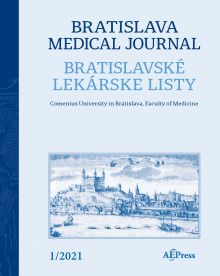Journal info
|
||||
Select Journal
Journals
Bratislava Medical Journal 2024 Ahead of print 2023 2022 2021 2020 2019 2018 2017 2016 2015 2014 2013 2012 Endocrine Regulations General Physiology and Biophysics Neoplasma Acta Virologica Studia Psychologica Cardiology Letters Psychológia a patopsych. dieťaťa Kovove Materialy-Metallic Materials Slovenská hudbaWebshop Cart
Your Cart is currently empty.
Info: Your browser does not accept cookies. To put products into your cart and purchase them you need to enable cookies.
Bratislava Medical Journal Vol.122, No.8, p.531–537,2021 |
||
| Title: Cardiovascular events and atherogenic lipid profile in chronic myeloid leukemia patients treated with nilotinib versus imatinib | ||
| Author: L. Petrikova, K. Slezakova, Z. Sninska, L. Harvanova, M. Martisova, A. Hatalova, M. Mistrik, A. Batorova, B. Mladosievicova | ||
| Abstract: OBJECTIVES: The aim of this study was to assess cardiotoxicity and potential adverse effects related to lipid metabolism during treatment with tyrosine kinase inhibitors (TKIs) imatinib and nilotinib in patients with chronic myeloid leukemia (CML). PATIENTS AND METHODS: Eighty-two consecutive patients with CML, who received nilotinib and/or imatinib in a single haemato-oncological Slovak center between years 2002–2018 were evaluated in a retrospective study. The mean age was 55.8 years (range 22–77 years). Median of follow-up was 61.3 months. RESULTS: A significantly higher incidence of dyslipidemia, significantly higher levels of potential risk markers of cardiovascular disease small dense LDL cholesterol (sdLDL-CH) and a significant increase in total cholesterol were found in the patients during treatment with nilotinib in comparison to imatinib. Dyslipidemia led to drug therapy in 22 % of the patients in the nilotinib group. Fourteen percent of the patients in the nilotinib group had one or more cardiovascular events, including peripheral artery disease (10 %), myocardial infarction (4 %) and stroke (4 %). CONCLUSION: A higher risk of cardiovascular events and atherogenic dyslipidemia were associated with nilotinib therapy. Patients treated with TKI, especially nilotinib, require an early modification of cardiovascular risk factors and a careful cardiologic surveillance so that antileukemic therapy with this highly effective agent could continue (Tab. 4, Fig. 3, Ref. 32). Text in PDF www.elis.sk |
||
| Keywords: tyrosine kinase inhibitors, cardiovascular events, dyslipidemia, small dense LDL-cholesterol, nilotinib, imatinib | ||
| Published online: 20-Jul-2021 | ||
| Year: 2021, Volume: 122, Issue: 8 | Page From: 531, Page To: 537 | |
| doi:10.4149/BLL_2021_085 |
||
|
|
 download file download file |
|

